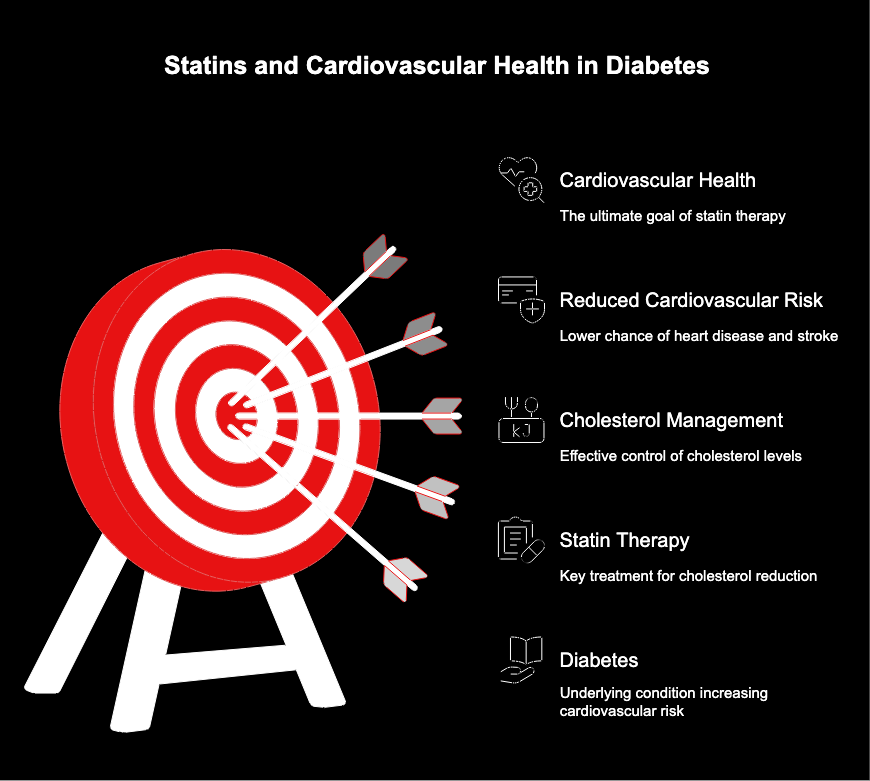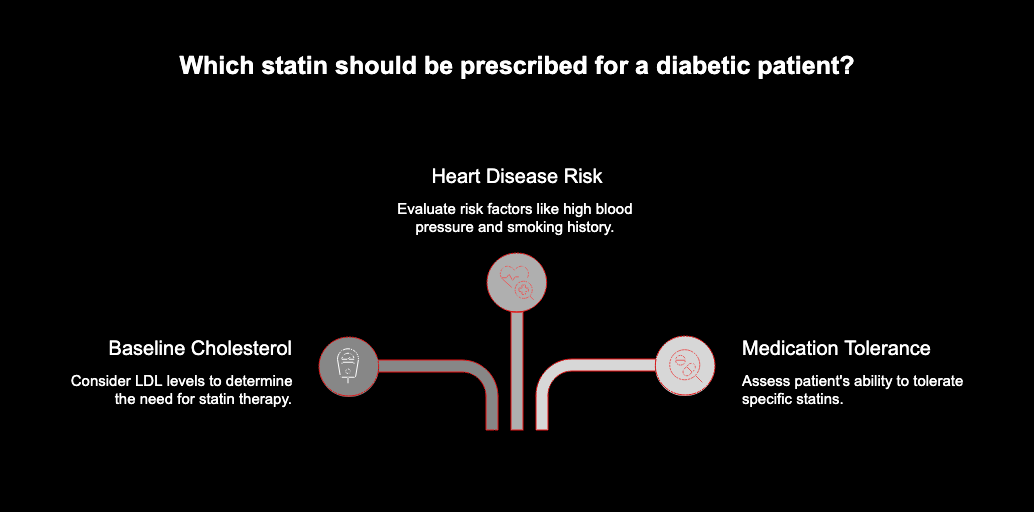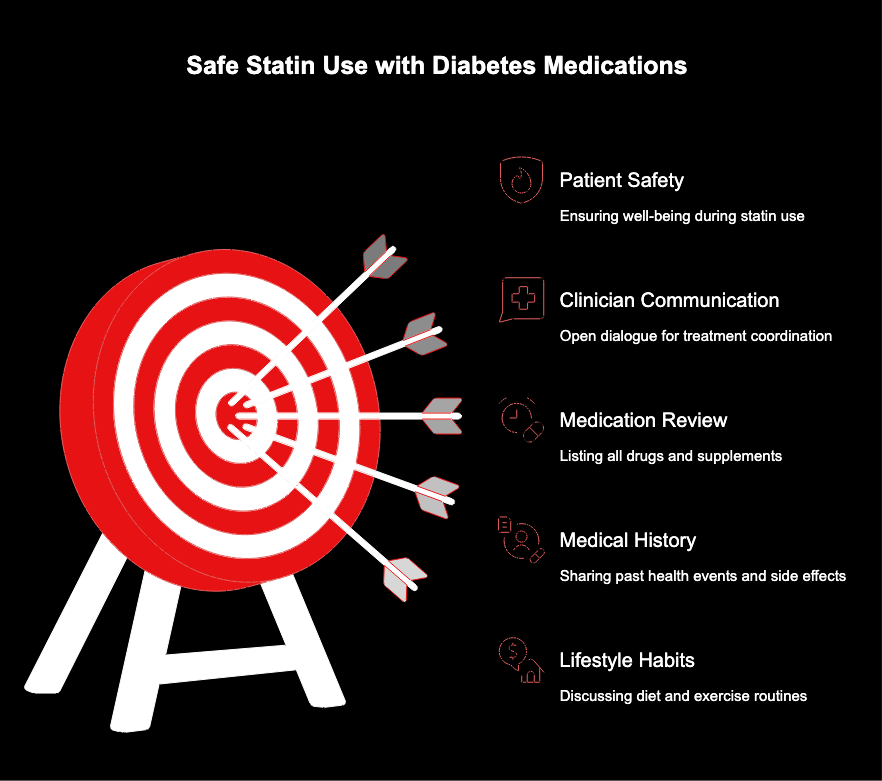
Key Highlights
- Individuals with diabetes are twice as likely to experience heart disease or a stroke.
- Statin therapy is a key treatment for lowering high cholesterol levels and reducing cardiovascular disease risk.
- A statin works by blocking cholesterol production and removing existing “bad” cholesterol from your blood.
- While statins can slightly raise blood sugar, their heart-protective benefits often outweigh this risk.
- Major health organizations recommend statins for most people with diabetes to prevent heart attack and stroke.
- Deciding not to take a recommended statin can significantly increase your risk of a major cardiovascular event.

Introduction
If you are living with diabetes, managing your heart health is just as important as monitoring your blood sugar. The connection between diabetes and heart disease is strong, making proactive care essential. One of the most common and effective tools your doctor may recommend is a statin. These cholesterol-lowering medications play a crucial role in preventing serious cardiovascular disease. This guide will explain why statins are so vital for people with diabetes and how they protect your heart.
Key Factors Affecting Heart Health in Diabetic Patients
Several key factors contribute to the increased risk of heart problems when you have diabetes. These elements can work together, compounding the danger and making diligent management essential for your well-being.
Your heart health is affected by a combination of conditions and lifestyle habits. The most significant risk factors for diabetic patients include:
- High blood sugar: Damages blood vessels over time.
- High cholesterol levels: Leads to plaque buildup in arteries.
- High blood pressure: Puts extra strain on your heart and arteries.
- Smoking: Narrows and damages blood vessels.
- Being overweight or obese: Increases strain on the cardiovascular system.
Each of these factors makes it harder for blood to flow freely through your body. When plaque builds up in your arteries, your heart muscle can weaken, increasing the risk of heart attack and other serious complications.
Types of Statins Commonly Prescribed in the United States
In the United States, your doctor has several types of statins to choose from when creating your treatment plan. Each one works in a similar way, but they vary in strength and how they interact with your body.
Some of the most common statins available include atorvastatin, simvastatin, and rosuvastatin. Your healthcare provider will select the best option for you based on your needs. Here are some of the statins prescribed in the U.S.:
|
Brand Name |
Generic Name |
|---|---|
|
Lipitor |
Atorvastatin |
|
Lescol XL |
Fluvastatin |
|
Altoprev |
Lovastatin |
|
Livalo |
Pitavastatin |
|
Crestor |
Rosuvastatin |
|
Zocor |
Simvastatin |
The decision on which statin to prescribe depends on your baseline cholesterol levels, your overall risk for heart disease, and your ability to tolerate a specific medication. Your doctor will work with you to find the right type and dosage for your situation.
Recommendations from American Heart Association and ADA
The guidelines from the American Heart Association and other prominent health organizations are clear: many people with diabetes should be on statins. Information from a gov website like the CDC and other expert sources supports a proactive approach to prevent heart disease in this population.
One of the main recommendations focuses on adults aged 40 to 75 who have diabetes. If your LDL cholesterol is between 70 and 189 mg/dL, these official government organization guidelines suggest starting statin therapy, even without a history of heart disease. This recommendation comes from a careful evaluation of the inherent risks associated with diabetes.
The advice to start statin therapy is even stronger if you have other risk factors, such as high blood pressure, a history of smoking, or evidence of blood vessel disease. The goal is to use statins as a preventive tool to lower your chances of a first-time heart attack or stroke.

Benefits of Statins Beyond Lowering Cholesterol
While statins are famous for their cholesterol-lowering abilities, their benefits don’t stop there. The effects of statins extend to providing additional protective effects for your cardiovascular system, which is especially important when you have diabetes.
These medications also play a role in stabilizing plaque that has already formed in your blood vessels and reducing inflammation. These secondary benefits are a major reason why statins are so effective at preventing heart attacks and strokes. Let’s examine these powerful advantages more closely.
Protective Effects of Statins on Blood Vessels and Inflammation
The protective effects of statins on your heart go far beyond just managing LDL cholesterol. These medications have a positive impact on the overall health of your blood vessels by addressing inflammation and plaque stability.
Statins offer several key benefits for your arteries that help keep them healthy and functioning properly. These include:
- Decreasing swelling: Statins reduce inflammation within the artery walls.
- Stabilizing plaque: They make existing plaque less likely to rupture.
- Reducing plaque buildup: They slow the accumulation of new cholesterol deposits.
- Lowering clot risk: They decrease the chance of dangerous blood clots forming.
By strengthening and protecting your blood vessels in these ways, statins provide a comprehensive defense against the damage that can lead to a heart attack or stroke. This makes them an invaluable tool for anyone with diabetes looking to safeguard their cardiovascular health.
How to Safely Combine Statins With Other Diabetes Medications
Statins can be safely and effectively combined with other diabetes medications for most people. The key to doing this safely is open and honest communication with your clinician to ensure your entire treatment plan is coordinated.
Before you start taking a statin, make sure to have a thorough discussion with your doctor. You should talk about:
- All other prescriptions, over-the-counter drugs, and supplements you are taking.
- Your complete medical history and any past side effects from medications.
- Your lifestyle habits, including diet and exercise.
By working closely with your healthcare provider, you can create a comprehensive plan for the management of blood cholesterol that fits seamlessly with your existing diabetes care. Your clinician can monitor your progress and make any necessary adjustments to keep you safe and healthy.

Conclusion
In summary, managing heart health is crucial for diabetics, and statins play a vital role in this regard. By lowering cholesterol levels and providing additional protective benefits against heart attacks and strokes, statins can significantly improve the overall health outcomes for those living with diabetes. It’s essential to consider not only the direct effects of statins but also how they integrate with other diabetes treatments. Always consult your healthcare provider to discuss the best approach tailored to your individual health needs. Taking proactive steps towards heart health can lead to a more balanced and fulfilling life. For personalized guidance, don’t hesitate to reach out and get a free consultation today!
Frequently Asked Questions
Can statins help if my cholesterol is already normal?
Yes, they can. For people with diabetes, heart disease risk is high even with normal cholesterol levels. Diabetes itself is a major risk factor, so a statin may be recommended to lower your overall cardiovascular risk, not just your LDL cholesterol numbers.
What should I discuss with my doctor before starting statins?
Before starting a statin, talk to your clinician about your health history, all other diabetes medications you take, and any concerns you have about side effects. This conversation ensures your doctor can create a safe and effective plan for the management of blood cholesterol.
Are there risks in not taking statins when managing diabetes?
Yes. If your doctor recommends a statin due to your risk factors, choosing not to take it leaves you vulnerable to a higher risk of heart attack and stroke. For people with diabetes, avoiding statin therapy can mean missing a critical opportunity to prevent atherosclerotic cardiovascular disease.


